- Home
- Lauren Willig
The Lure of the Moonflower Page 38
The Lure of the Moonflower Read online
Page 38
These things are always perfect—until you start writing them.
As you can see, while Jack and Jane are very much the people I knew they would be, that original campfire scene went the way of the dodo. As did pretty much everything else I had planned for them along the way.
There are two Pink XIIs. There’s the book you’re holding in your hand. And there’s the book I meant to write. My original plan for Pink XII (and when I say “original,” I mean the plan I concocted when I began writing this in 2014, not the thousand vaguely imagined plans I entertained over the past fourteen years) involved a foil for Jane, a Portuguese marquesa who would be ally, suspect, and rival. She would also be a way to get some Portuguese history in there and have a glimpse of the elegant, cultured world of the Portuguese aristocracy. The idea was for her to be one of Jack’s contacts. When Jane approached Jack about tracking the Queen, he naturally would suggest they stop in and see the marquesa on the way to Porto. It would be at her house that they would encounter the Gardener, aka the Comte de Brillac.
But then Jane went and pulled that stunt at the tavern, posing as a French soldier, and the next thing I knew, Jack and Jane’s book had taken a very different, much more rough-and-tumble path. Instead of traveling by the marquesa’s carriage, they acquired a donkey.
Part of me wishes I could write that book, too, just to see how it would turn out. But I’m not sure Jack and Jane would let me. They had very strong feelings about the progress of their book—most of them entirely contrary to the wishes and plans of their author.
Q. Will you ever write another Pink book?
A. I never say never. Well, hardly ever. The truth is, I just don’t know. Are there Pink books I want to write? Absolutely. Kat and Tommy’s story is still waiting to be told, Lizzy and Nicolas are just taunting me with the prospect of their romance, and I never did get around to that mystery novel featuring Colin and Eloise, or that prequel series about the elder Uppingtons.
But the market changes and so do authors. I’ve been writing this series for a very long time now—through grad school, law school, practice at a firm, multiple moves, a marriage, a baby—and it was time to try something new. I tried to juggle the stand-alone novels and the Pinks, but it was tough, and proved to me that, for the time being, at least, I need to focus on either one or the other.
Q. What happens to all of the characters after the series ends?
A. I started to write pocket histories of all of them, which is when I realized, Wow, there have been an awful lot of Pink books and an awful lot of heroes and heroines.
Some of them, like Laure and Andre or Mary and Vaughn, have their future history recounted in the Eloise sections of their own books. So I’ve left those out and just concentrated on those characters whose futures haven’t been explored. As far as I can remember. After twelve books, one does start to get a bit blurry. . . .
Richard and Amy continue to run that spy school, and, to everyone’s surprise, make such a success of it that it becomes genuinely secret and shadowy and has to be moved from the grounds of Selwick Hall to an Undisclosed Location. The school continues within the family well into the reign of Victoria, although, given the whole secretive and shadowy thing—and they do become very good at secretive and shadowy—it’s hard to tell just how long it lasts. Either way, the spy tradition continues strong in the family up through the present day. Even if Colin is not, in fact, a spy.
Miles never does succeed in getting that ginger biscuit recipe out of Cook. (Clearly this was a cunning ploy on the part of Lady Uppington to ensure that her daughter, son-in-law, and grandchildren could never stray too far from Uppington House.) Henrietta continues meddling happily in the lives of her friends, and, not to put too fine a point on it, eventually turns into her mother. Only slightly taller. Miles eventually succeeds to his father’s title, and Viscount and Viscountess Loring are always in great demand on the social circuit.
Geoff and Letty are enormously prolific in every possible way. When not looking after their nine children, Geoff is busy with the House of Lords and a seat in the Duke of Wellington’s cabinet. He also takes a great interest in the police force being formed by Sir Robert Peel. Letty, in the meantime, has written the Practical Viscountess’s Book of Household Advice, a book that absolutely mortifies her older sister, Lady Vaughn, who feels that no member of the peerage should have anything to do with a) practicality, b) household advice, or c) books.
Robert, to everyone’s surprise (but most especially that of the Dowager Duchess of Dovedale), warms to the idea of being duke and begins to experiment with ways to improve the lives of the tenantry. With Charlotte’s assistance, he plots out a series of model farms—although Charlotte does secure his promise that she will not have to wear traditional shepherdess costume. At least, not in public.
Aside from a few brief visits to England, Penelope and Alex live out the rest of their lives in India, where Alex is commissioner of a small (and imaginary) district, Karnatabad. Although Penelope finds herself unable to carry a child to term, she adopts five children from a nearby village whose parents died of cholera, shocking the English community, especially the wife of Alex’s assistant district commissioner. While shocking the English community was the main point, both Penelope and Alex become deeply attached to their wards and consider them their true sons and daughters.
Turnip remains Turnip and lives happily ever after with the Arabella, who loves him, their five children, and a large supply of raspberry jam.
Sally Fitzhugh adores being Duchess of Belliston. And the Duke of Belliston adores the Duchess of Belliston—although his feelings are slightly less warm, and rather more fuzzy, in regard to her pet stoat.
Agnes Wooliston shocks everyone by coming out of her shell with a vengeance as a very early supporter of women’s suffrage, deeply influencing Jeremy Bentham’s 1817 Plan of Parliamentary Reform. She strongly lobbies journalist (and later MP) Augustus Whittlesby for his support for votes for women. Augustus tries, but is deeply outnumbered during the debates over the Reform Act of 1832.
Parsnip Fitzhugh (née Jane) grows up best friends with Plumeria Reid and Emmeline Pinchingdale-Snipe. Don’t even think of asking about the Season of 1825. Or, for that matter, the Season of 1826. You just don’t want to know. . . .
Plumeria Reid, after causing the maximum amount of scandal and bother, eventually marries Percy Selwick, a match that surprises no one except, potentially, the two parties primarily involved.
But what can one expect of a son of Amy and a daughter of Miss Gwen?
Have I left out anyone or anything important? If so, just e-mail me through my Web site, www.laurenwillig.com, and I’ll be happy to answer any questions you might have.
Q. What are you working on now?
A. Right now, Beatriz Williams, Karen White, and I are just polishing up the manuscript of The Forgotten Room, a novel set around a Gilded Age mansion in New York, the women who live there in 1892, 1920, and 1944, and the secret that connects them all. The Forgotten Room will appear in stores in January of 2016. We had a blast writing it, and we already have our heads together over another one.
Once the Forgotten Room revisions are done, I’ll be hunkering down over my fourth stand-alone novel, a multigenerational family saga sweeping from Gilded Age New York to Belle Époque Paris, the Roaring Twenties, and World War II France.
For more on those and all the other books, just stop by my Web site, www.laurenwillig.com, or visit me on my Facebook author page, http://www.facebook.com/LaurenWillig.
QUESTIONS FOR DISCUSSION
1. Even before they had a chance to work together, Jack and Jane had already formed fairly solid judgments about each other’s characters. What do you think this says about the power of reputations? Was there some truth to their assumptions? How are their assumptions about each other proven wrong by their actions?
2. Discuss the role that societal norms and class play in t
he book, and how the main characters are affected by their perceived status.
3. Jack and Jane are both very determined individuals who prefer being in control of a situation, rather than sharing the reins of power. Do you think that either of them had the upper hand at the beginning of the book? What moment (if there is one) brings about a shift in the power dynamic between them? How does this shift affect their relationship going forward? How do you think things might have been different if they shared the decision making from the start?
4. Talk about Jane’s resistance to conventions such as manners, marriage, and mores. How might her life have been different if she’d lived in a more modern era? Do you think she still would have become a spy? How would that have been different?
5. What characteristics do you think make Jack and Jane good spies? What about them makes them good partners—and lovers? Are the characteristics the same?
6. How do you think Jack’s childhood—his mother’s suicide, his strained relations with his father, his outside status as a half-caste—shaped his character and the way he views himself and the decisions he made?
7. Was it surprising to you that Colin’s great-aunt was a spy? Do you think it is fitting that the descendants of the Selwicks would still carry on spying in the modern world?
8. What name do you think Jack and Jane should finally settle upon for their pet donkey?
9. Did you know much about Portugal during the Napoleonic era before reading The Lure of the Moonflower? Did you learn anything new about this period in time? Do you prefer learning about history through fictional characters or through narrative nonfiction accounts?
10. If you were Jane, would you have chosen Jack or Nicolas? Discuss the merits and shortcomings of each of them.
11. Out of all the characters in the Pink Carnation books, which one would you choose to take out for a cup of tea? Who was your favorite couple? Discuss why.
Start at the beginning of the charming Pink Carnation series by Lauren Willig
The Secret History of the Pink Carnation
Available from New American Library.
“...The city of your birth awaits your return. Please send word of your travel arrangements by courier at first opportunity. I remain, your devoted brother, Edouard.”
“The city of your birth awaits your return.” Amy whispered the words aloud.
At last! Fingers tightening around the paper in her hands, she gazed rapturously at the sky. For an event of such magnitude, she expected bolts of lightning, or thunderclouds at the very least. But the Shropshire sky gazed calmly back at her, utterly unperturbed by the momentous events taking place below.
Wasn’t that just like Shropshire?
Sinking to the grass, Amy contemplated the place where she had spent the majority of her life. Behind her, over the rolling fields, the redbrick manor house sat placidly on its rise. Uncle Bertrand was sure to be right there, three windows from the left, sitting in his cracked leather chair, poring over the latest findings of the Royal Agricultural Society, just as he did every day. Aunt Prudence would be sitting in the yellow-and-cream morning room, squinting over her embroidery threads, just as she did every day. All peaceful, and bucolic, and boring.
The prospect before her wasn’t any more exciting, nothing but long swaths of green, enlivened only by woolly balls of sheep.
But now, at last, the long years of boredom were at an end. In her hand she grasped the opportunity to leave Wooliston Manor and its pampered flock behind her forever. She would no longer be plain Amy Balcourt, niece to the most ambitious sheep breeder in Shropshire, but Aimée, Mlle de Balcourt. Amy conveniently ignored the fact that revolutionary France had banished titles when they beheaded their nobility.
She had been six years old when revolution exiled her to rural England. In late May of 1789, she and Mama had sailed across the Channel for what was meant to be merely a two-month visit, time enough for Mama to see her sisters and show her daughter something of English ways. For all the years she had spent in France, Mama was still an Englishwoman at heart.
Uncle Bertrand, sporting a slightly askew periwig, had stridden out to meet them. Behind him stood Aunt Prudence, embroidery hoop clutched in her hand. Clustered in the doorway were three little girls in identical muslin dresses, Amy’s cousins Sophia, Jane, and Agnes. “See, darling,” whispered Mama. “You shall have other little girls to play with. Won’t that be lovely?”
It wasn’t lovely. Agnes, still in the lisping and stumbling stage, was too young to be a playmate. Sophia spent all of her time bent virtuously over her sampler. Jane, quiet and shy, Amy dismissed as a poor-spirited thing. Even the sheep soon lost their charm. Within a month, Amy was quite ready to return to France. She packed her little trunk, heaved and pushed it down the hall to her mother’s room, and announced that she was prepared to go.
Mama had half-smiled, but her smile twisted into a sob. She plucked her daughter off the trunk and squeezed her very, very tightly.
“Mais, maman, qu’est-ce que se passe?” demanded Amy, who still thought in French in those days.
“We can’t go back, darling. Not now. I don’t know if we’ll ever . . . Oh, your poor father! Poor us! And Edouard, what must they be doing to him?”
Amy didn’t know who they were, but remembering the way Edouard had yanked at her curls and pinched her arm while supposedly hugging her good-bye, she couldn’t help but think her brother deserved anything he got. She said as much to Mama.
Mama looked down at her miserably. “Oh no, darling, not this. Nobody deserves this.” Very slowly, in between deep breaths, she had explained to Amy that mobs had taken over Paris, that the king and queen were prisoners, and that Papa and Edouard were very much in danger.
Over the next few months, Wooliston Manor became the unlikely center of an antirevolutionary movement. Everyone pored over the weekly papers, wincing at news of atrocities across the Channel. Mama ruined quill after quill penning desperate letters to connections in France, London, Austria. When the Scarlet Pimpernel appeared on the scene, snatching aristocrats from the sharp embrace of Madame Guillotine, Mama brimmed over with fresh hope. She peppered every news sheet within a hundred miles of London with advertisements begging the Scarlet Pimpernel to save her son and husband.
Amidst all this hubbub, Amy lay awake at night in the nursery, wishing she were old enough to go back to France herself and save Papa. She would go disguised, of course, since everyone knew a proper rescue had to be done in disguise. When no one was about, Amy would creep down to the servants’ quarters to try on their clothes and practice speaking in the rough, peasant French of the countryside. If anyone happened upon her, Amy explained that she was preparing amateur theatricals. With so much to worry about, none of the grown-ups who absently said, “How nice, dear,” and patted her on the head ever bothered to wonder why the promised performance never materialized.
Except Jane. When Jane came upon Amy clad in an assortment of old petticoats from the ragbag and a discarded periwig of Uncle Bertrand’s, Amy huffily informed her that she was rehearsing for a one-woman production of Two Gentlemen of Verona.
Jane regarded her thoughtfully. Half apologetically, she said, “I don’t think you’re telling the truth.”
Unable to think of a crushing response, Amy just glared. Jane clutched her rag doll tighter, but managed to ask, “Please, won’t you tell me what you’re really doing?”
“You won’t tell Mama or any of the others?” Amy tried to look suitably fierce, but the effect was quite ruined by her periwig sliding askew and dangling from one ear.
Jane hastily nodded.
“I,” declared Amy importantly, “am going to join the League of the Scarlet Pimpernel and rescue Papa.”
Jane pondered this new information, doll dangling forgotten from one hand.
“May I help?” she asked.
Her cousin’s unexpected aid proved a boon to Amy. I
t was Jane who figured out how to rub soot and gum on teeth to make them look like those of a desiccated old hag—and then how to rub it all off again before Nanny saw. It was Jane who plotted a route to France on the nursery globe and Jane who discovered a way to creep down the back stairs without making them creak.
They never had the chance to execute their plans. Little beknownst to the two small girls preparing themselves to enter his service, the Scarlet Pimpernel foolishly attempted the rescue of the Vicomte de Balcourt without them. From the papers, Amy learned that the Pimpernel had spirited Papa out of prison disguised as a cask of cheap red wine. The rescue might have gone without a hitch had a thirsty guard at the gates of the city not insisted on tapping the cask. When he encountered Papa instead of Beaujolais, the guard angrily sounded the alert. Papa, the papers claimed, had fought manfully, but he was no match for an entire troop of revolutionary soldiers. A week later, a small card had arrived for Mama. It said simply, “I’m sorry,” and was signed with a scarlet flower.
The news sent Mama into a decline and Amy into a fury. With Jane as her witness, she vowed to avenge Papa and Mama as soon as she was old enough to return to France. She would need excellent French for that, and Amy could already feel her native tongue beginning to slip away under the onslaught of constant English conversation. At first, she tried conversing in French with their governesses, but those worthy ladies tended to have a vocabulary limited to shades of cloth and the newest types of millinery. So Amy took her Molière outside and read aloud to the sheep.

 That Summer
That Summer The Mischief of the Mistletoe
The Mischief of the Mistletoe The Mark of the Midnight Manzanilla
The Mark of the Midnight Manzanilla The Other Daughter
The Other Daughter The Ashford Affair
The Ashford Affair The Lure of the Moonflower
The Lure of the Moonflower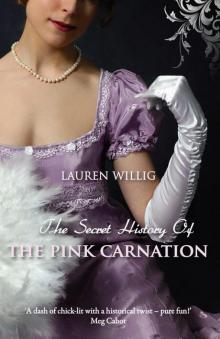 The Secret History of the Pink Carnation
The Secret History of the Pink Carnation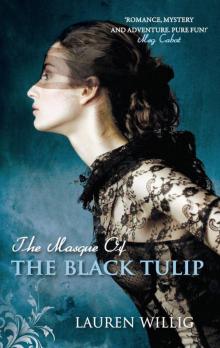 The Masque of the Black Tulip
The Masque of the Black Tulip The Passion of the Purple Plumeria
The Passion of the Purple Plumeria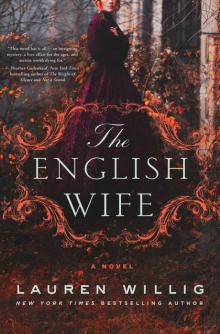 The English Wife
The English Wife The Garden Intrigue
The Garden Intrigue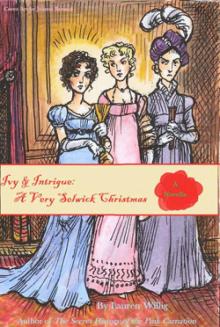 Ivy and Intrigue: A Very Selwick Christmas
Ivy and Intrigue: A Very Selwick Christmas The Orchid Affair
The Orchid Affair The Summer Country
The Summer Country The Betrayal of the Blood Lily
The Betrayal of the Blood Lily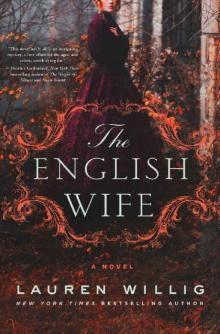 The English Wife: A Novel
The English Wife: A Novel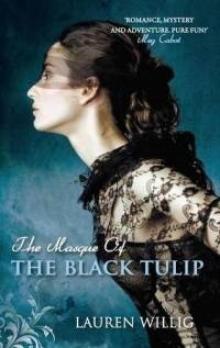 Masque of the Black Tulip pc-2
Masque of the Black Tulip pc-2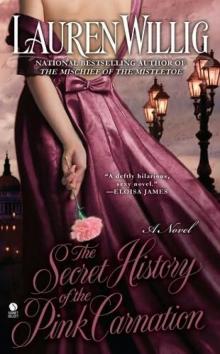 The Secret History of the Pink Carnation pc-1
The Secret History of the Pink Carnation pc-1 That Summer: A Novel
That Summer: A Novel The Mischief of the Mistletoe: A Pink Carnation Christmas
The Mischief of the Mistletoe: A Pink Carnation Christmas